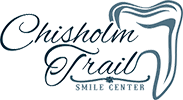When should you see a doctor about your snoring?
- Chest pain during the night
- Excessive daytime drowsiness
- Noticeable pauses in breathing during sleep
- Sore throat in the morning
- Choking or gasping at night
Usually, people with OSA snore uninterrupted during the night, broken up by brief pauses where breathing ceases or nearly ceases. Because of the increased risks associated with sleep apnea, it’s a good idea to have your case examined by a professional.
How We Diagnose Sleep Apnea
Here at Chisholm Trail Smile Center, Dr. Bridges works closely with a local sleep specialist, Dr. Jones, so you can ensure your diagnosis is solid. Dr. Bridges himself is also a member of the American Academy of Sleep Medicine, and can provide you with a wealth of information on the subject.
Treatment Options
- Continuous positive airway pressure (CPAP): For those with moderate to severe sleep apnea, this machine delivers greater air pressure to your lungs while you sleep. While it is one of the most common and reliable treatment methods available, it takes time to adjust to using the device nightly.
- Oral appliances: Oral appliances can help mitigate the problem by propping the mouth open just enough to allow for increased airflow in the upper airway. The specifics of oral appliance therapy is discussed below in more detail.
- Treatment for associated conditions: Sometimes, sleep apnea is caused by associated medical issues, such as heart disorders. Treating these other conditions first may help improve one’s sleep apnea.
Depending on the cause of your sleep apnea, you may need to combine multiple treatment methods, or perhaps simple lifestyle changes are all you need. Always consult with your sleep specialist and dental professional, to ensure you’re receiving the best treatment possible.
